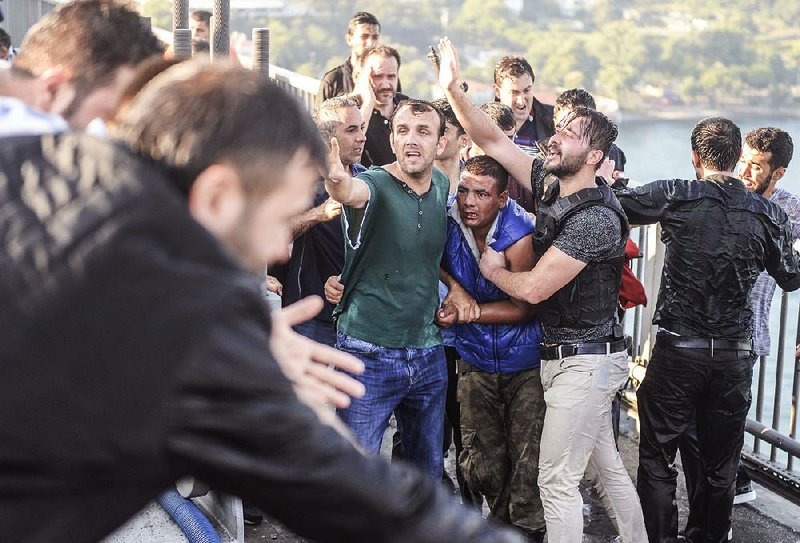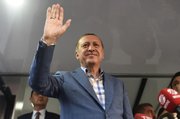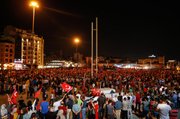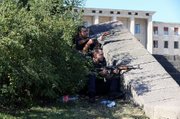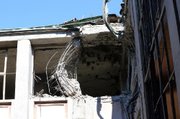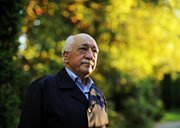ISTANBUL -- Turkey's government, rallying behind its president, rounded up thousands of military personnel Saturday who were said to have taken part in Friday's attempted coup, moving swiftly to re-establish control after a night of chaos and intrigue that left hundreds dead.
By midday Saturday, there were few signs that those who had taken part in the coup attempt were still able to challenge the government, and many officials declared the uprising a failure. The death toll in the clashes was put at 265.
President Recep Tayyip Erdogan, speaking to hundreds of flag-waving supporters outside his home in Istanbul on Saturday evening, declared that "the strong aren't always right, but the right are always strong." He called on the United States to arrest an exile living in Pennsylvania. Erdogan claims that exile was behind the coup attempt.
As the insurrection unfolded Friday night, beginning with the seizing of two bridges in Istanbul by military forces, Erdogan was not heard from for hours. He finally addressed the nation from an undisclosed location, speaking on his cellphone's FaceTime app.
In the early hours of Saturday, he had landed in Istanbul and was lashing out at his opponents, one in particular.
Erdogan blamed the followers of Fethullah Gulen, a Muslim cleric who lives in exile in Pennsylvania and was the president's ally until a bitter falling out three years ago. Gulen's followers are known to have a strong presence in Turkey's police and judiciary, though less so in the military.
Gulen, a staunch democracy advocate, has been put on trial in absentia in Turkey, which recently classified his movement as a terrorist organization. Washington, however, has never found any compelling evidence against the cleric.
In a statement released on the website of Gulen's group, Alliance for Shared Values, and in an interview with The New York Times on Saturday, Gulen condemned the coup, denied any link to it and expressed support for the democratic process, saying that "through military intervention, democracy cannot be achieved."
On Saturday morning, Erdogan said, referring to Gulen, "I have a message for Pennsylvania: You have engaged in enough treason against this nation. If you dare, come back to your country."
Later Saturday, Erdogan, standing atop a bus outside his home, called on the U.S. to arrest Gulen and send him back to Turkey.
Even before Erdogan's speech, the gist of which U.S. officials have heard before, Secretary of State John Kerry said he would listen to any inquiries Turkey might have about the cleric.
"We fully anticipate that there will be questions raised about Gulen," Kerry said.
As accusations mounted, U.S.-Turkish tensions escalated.
Erdogan said Saturday that Turkey had never rejected a U.S. extradition request for "terrorists." Addressing Washington, he said, "If we are strategic partners, then you should bring about our request."
Erdogan's emphasis on U.S.-Turkish counterterrorism cooperation raised the prospect of a prolonged closure of the Incirlik air base, which was temporarily shut down Saturday, if he doesn't get his way.
The air base has been used for missions against the Islamic State militant group in Syria and Iraq. The Pentagon said it was trying to get permission to resume air operations from that base, while adjusting mission operations in the meantime.
Turkey's labor minister, Suleyman Soylu, went further, suggesting that the U.S. was behind the coup.
A stung Obama administration, which had expressed support for Erdogan when it seemed his government might topple, fired back at its NATO ally.
"Public insinuations or claims about any role by the United States in the failed coup attempt are utterly false and harmful to our bilateral relations," Kerry told Turkish Foreign Minister Mevlut Cavosoglu in a phone call, according to the State Department's readout of the call.
Kerry reiterated U.S. support for Turkey's democratically elected government, according to the readout, and urged authorities to respect the rule of law and safeguard civilian life as they respond to the coup attempt. Kerry also said Turkey needs to respect due process as it investigates those it believes were involved in the plot.
Insurrection's toll
Prime Minister Binali Yildirim called the insurrection "a stain in the history of democracy." He put the death toll at 265, including civilians, pro-government forces and troops involved in the coup attempt, and said 1,440 people had been wounded. He added that 2,839 military personnel had been detained.
Also, the High Council of Judges and Prosecutors announced that 2,745 judges had been dismissed, the Anadolu Agency reported.
Later in the day, Defense Minister Fikri Isik said state authorities were in full control of all areas in Turkey but that vigilance was required.
"We have prevented the coup," Isik said, "but it is too soon to say that the danger is over."
Much of the violence overnight that was related to the coup attempt was in Ankara, Turkey's capital, where different branches of the security forces fought one another over control of government buildings, including the parliament building, where several explosions were reported.
Erdogan said Turkish fighter jets had bombed tanks on the streets of Ankara and that a military helicopter being used by the coup plotters had been shot down.
There also was a battle early Saturday at Turkey's intelligence headquarters in Ankara, and a Turkish official said the intelligence chief, Hakan Fidan, had been taken to a secure location.
In a news briefing Saturday, Turkey's top military officer, Gen. Umit Dundar, the acting head of the general staff, said "the coup attempt was rejected by the chain of command immediately."
Early Saturday, soldiers surrendered on a bridge that traverses the Bosporus, one of two bridges that the military shut down as the coup attempt began Friday evening. Video footage showed abandoned military clothing and helmets along the bridge. The government also moved on a military school in Istanbul, arresting dozens.
Dundar emphasized that only a small minority within the military, including members of the air force, a military-style police force and armored units, were involved in the revolt.
"The army is ours," Erdogan said Saturday night. "I am the chief commander."
Supporters of the government demonstrated in Istanbul and other cities Saturday night, chanting their disdain for the coup attempt as drivers honked their horns.
Government supporters marched through Ankara. Some gathered outside parliament and amid burned-out cars outside the presidential palace. One man took a selfie with a Turkish police officer standing atop an abandoned tank.
"We are here for democracy, so the country lasts," retired soldier Nusret Tuzak said at the Ankara gathering.
By late Saturday afternoon, flights had resumed into Istanbul's international airport after being halted for nearly 24 hours. Mostly national carriers were flying into Istanbul. Other airlines preferred to wait another day until the security situation was more settled.
In an unusual show of unity, Turkey's four main political parties released a joint declaration during an extraordinary parliamentary meeting Saturday, denouncing the coup attempt and claiming that any moves against the people or parliament will be met "with the iron will of the Turkish Grand National Assembly resisting them."
Turkey's NATO allies also lined up to condemn the coup attempt.
President Barack Obama, German Chancellor Angela Merkel and NATO chief Jens Stoltenberg urged all sides to support Turkey's democratically elected government.
Obama and Merkel affirmed their support for the NATO ally Friday after Turkish army officers initially said they had seized power and Erdogan appeared on television urging people to take to the streets to defend his government.
Stoltenberg called for "calm and restraint" in what he called a "vital" coalition ally.
The United Nations Security Council was trying to agree Saturday on a statement condemning the coup attempt after there were objections from at least one country, according to a diplomat.
Turkey is viewed as a critical NATO ally because of its strategic geographic position between Europe and Asia, a bridge that has served as an entryway for migrants fleeing violence in Syria. The country hosts about 1,500 U.S. military personnel and aircraft at Incirlik air base in the south.
Coup Praise in Egypt
Elsewhere, some of Egypt's pro-army media jumped the gun in their reporting on Friday night's attempted coup in Turkey, declaring it a success and welcoming the overthrow of Erdogan.
At least three newspapers ran headlines Saturday declaring that Turkey's army had overthrown Erdogan. But by the time their print editions were released, Turkey's government had largely succeeded in quashing the coup.
By Saturday morning, the mood had changed as pro-democracy activists in Egypt took to social media networks to post comments about the failure of the coup and publish photos of army officers and soldiers captured by civilians. Many of them listed Erdogan's crackdown on Turkish journalists and his authoritarian tendencies, but asserted that military coups were not a valid means of change.
Gamal Eid, a prominent rights lawyer who has been banned from traveling abroad, said on Facebook that since the coup has failed, pro-democracy activists could return to criticizing Erdogan and "his animosity toward the media."
"I wish he would learn his lesson and stop his hatred for the Internet, which he has used today to have his voice heard," he said.
Egypt's government has yet to issue any statements about Turkey's coup attempt, except to warn its citizens in Turkey to stay at home and avoid the conflict, and to announce that it had set up a unit at the Foreign Ministry to provide assistance for Egyptians in Turkey and help evacuate those stranded at Istanbul's airport.
Information for this article was contributed by Tim Arango, Ceylan Yeginsu, Eric Schmitt and Dan Bilefsky of The New York Times; by Suzan Fraser, Dominique Soguel, Bradley Klapper and Brian Rohan of The Associated Press; and by Nick Wadhams, Mike Dorning, Tony Capaccio, Angela Greiling Keane and Kambiz Foroohar of Bloomberg News.
A Section on 07/17/2016
